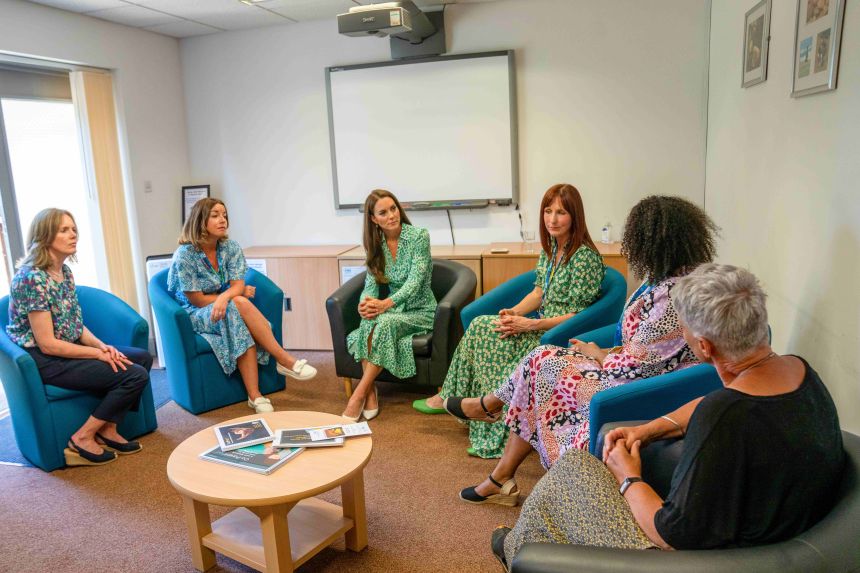New Royal partnership study to promote infant wellbeing and development.
Thursday 15th Jun 2023, 2.42pm
The Princess met Professor Barlow and health visitors taking part in the study yesterday, when she visited Riversley Park Children’s Centre in Nuneaton.
The work of The Centre for Early Childhood seeks to raise awareness of why early childhood matters and to translate this evidence from neuroscience into practice. A grant from the Royal Foundation will support health visitors in this area through a small-scale field trial to support the promotion of infant wellbeing and by enhancing health visitors’ ability to identify infants at risk.
 The Princess of Wales meeting the study team at Nuneaton, including Professor Jane Barlow (far right)
The Princess of Wales meeting the study team at Nuneaton, including Professor Jane Barlow (far right)Credit: The Royal Foundation.
Study leader, Jane Barlow, Professor of Evidence Based Intervention and Policy and head of Oxford’s Department of Social Policy, says, ‘This is a very exciting opportunity to focus on babies’ behaviour, using the new observation tool, the ADBB. This tool can help health visitors focus on the ways babies communicate, using eye contact, facial expressions and vocalisation etc. We can learn so much by using it and potentially help identify those families where additional support might be needed.’
This is a very exciting opportunity to focus on babies’ behaviour…the ways babies communicate, using eye contact, facial expressions and vocalisation..
Professor Jane Barlow
Meanwhile, Alison Morton, iHV CEO says, ‘We are delighted to be working with Her Royal Highness The Princess of Wales, The Royal Foundation Centre for Early Childhood and Professor Jane Barlow on this exciting new programme of work with health visitors. Through working with Her Royal Highness, I know how committed she is to helping all children have a happy and healthy childhood and this can only happen if we have a much greater focus on the earliest years of life – everyone has a part to play to make sure that no child is left behind.’
There is a growing body of research on the importance of the earliest years of life. During this period from pregnancy to age five, in particular during the “critical first 1001 days”, babies’ brains are developing faster than at any other time of their lives. They are shaped by early experiences and learn to manage emotions and build relationships, develop resilience against adversity and trust in others.
Her Royal Highness…[is] committed…to helping…children have a happy and healthy childhood and this can only happen if we have a much greater focus on the earliest years of life – everyone has a part to play to make sure that no child is left behind
Alison Morton, Institute of Health Visiting
Scientific research over the last 20 years has shown the many different ways babies can communicate through their behaviour.
The ADBB is an observation tool that helps health visitors focus on the different aspects of babies’ behaviour (eye contact, facial expression, vocalisation and activity levels).
It will be used as part of the health visitor’s routine visit with all families, helping practitioners and parents to better understand the ways babies express their enjoyment as well as the things that they are finding more difficult.
Health visitors will then work with parents to support the baby’s wellbeing and social development. All babies are different and that is a real benefit of this tool as it helps to understand each baby as an individual.
The ADBB was developed in France and is widely used in many other countries. This study will help us understand how it works with parents in England – and in the context of the HV service in England.
During her visit to Denmark in February 2022, The Princess was particularly interested in how the ADBB tool was being used with positive outcomes by frontline health visitors as part of their routine examinations of babies during home visits and was keen to explore if a similar approach could work within the health visiting service in England.
This study aims to conduct a small-scale field trial across two sites to assess the acceptability and feasibility of implementing the ADBB into health visitors’ routine home visits with families in England.
An Expert Advisory Group comprising senior academics, government officials and key stakeholders will provide advice on the study to enrich and enhance the project’s rigour and support dissemination of the learning in line with the national ambitions to ‘give every child the best start in life’.

